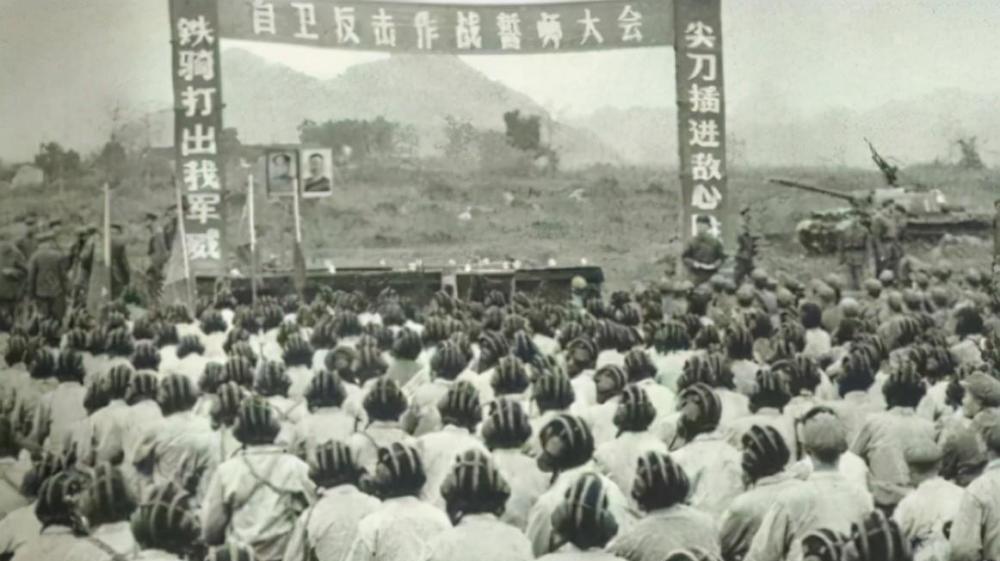During the Ho Chi Minh period, China and Vietnam had a "comrade-plus-brother" relationship. We have made great efforts in Vietnam's anti-French struggle and anti-US struggle, asking people to give people and things to things, and General Chen Geng personally rushed to Vietnam to help them fight. At that time, the Vietnamese army was very weak, and the level of commanders was relatively low, and it was with our vigorous help that the struggle against France and the struggle against the United States was won. But after Lai Sung came to power, he not only forgot all about our help to Vietnam, but also often provoked incidents at the border, killing and injuring my innocent border people.

We have repeatedly advocated a negotiated solution to the problem, but Lê Thanh not only turned a deaf ear but also intensified his territorial claims to us, which is intolerable, and in this context, the self-defense counterattack war against Vietnam has begun. On February 17, 1979, under the command of Xu Shiyou and Yang Dezhi, hundreds of thousands of our troops launched a comprehensive counterattack against the enemy from the east and west fronts. The 163rd Division of the 55th Army, under the command of division commander Bian Guixiang, pounced on the enemy of Tongdeng.
General Bian Guixiang
Dong Dheng is an important military town in northern Vietnam, and in order to defend Thon, the Vietnamese army has built intricate fortifications here, and the fire points are as dense as a honeycomb. Responsible for the defense of Dong Deng was the 12th Regiment of the 3rd Division of the Vietnamese Army, plus other local armies, artillery and public security units, with a total strength of more than 5,000 troops. At dawn on 17 February, the 163rd Division concentrated 170 artillery pieces and launched a fierce artillery attack on the enemy in front of them. The infantry then began to charge, and after several hours of fierce fighting, the 488th and 487th Regiments successively captured the key points of the exploration ridge, Quemei and the line, cutting off the enemy's left wing retreat.
At the same time, the 489th Regiment also successively captured the 386th Height and the 402nd Highland, and the Remaining 488th Regiment and the 487th Regiment together formed a joint encirclement against the enemy in Tongdeng. Before the war, the enemy's 12th Regiment was very arrogant, and once shouted that "I would fight until I reached friendship pass for breakfast and fight to Nanning for the Spring Festival." However, under the onslaught of the 163rd Division, it was soon out of support and hurriedly asked the division headquarters for help. In order to relieve the siege of Dong Deng, the Vietnamese 3rd Division sent a regiment of troops to carry out a continuous counterattack on the 18th, but was repulsed by the 488th Regiment.
Seeing that there was no hope of being rescued, the enemy 12 regiments began to rely on a certain highland and the Ghost Tun Fort to resist in order to avoid the fate of being completely annihilated. In order to resolve the battle as soon as possible, Commander Bian Guixiang ordered a general attack on the enemy, and after three days and four nights of bitter fighting, most of the remnants of the enemy were destroyed and Tongdeng was captured. In the Battle of Tongdeng, the 163rd Division killed 2387 enemies and captured 24 enemy, with remarkable results. Because the enemy stubbornly resisted, our army also paid a certain price of casualties, and the sacrifice of Deputy Company Commander Luo Yuening was particularly painful.
Luo Yuening, a native of Ji'an, Jiangxi, was born in 1953 and joined the army at the age of 16. After the counterattack against the Vietnamese self-defense began, he followed the 163rd Division to participate in the Battle of Dong Deng, personally leading a platoon to capture two enemy heights in succession, showing great bravery. In the final stage of the campaign, the enemy stubbornly resisted and counterattacked madly, and one part of our army was surrounded by the enemy. In order to rescue his comrades-in-arms, Luo Yuening went in and out three times in the enemy's encirclement and rescued several comrades-in-arms. However, when he rushed into the enemy's encirclement for the fourth time, he was unfortunately hit by the enemy's bullets, and he was hit by 4 bullets and died heroically, at the age of 26.
When Luo Yuening joined the army, he deliberately concealed his true identity, saying that his parents were ordinary people. When his body was returned to China, it was discovered that he was the son of General Luo Rong. Luo Rong enlisted in the army in August 1937 and participated in the War of Resistance Against Japanese Aggression and the War of Liberation. After the founding of New China, he served as the political commissar of the 55th Army, the deputy chief of staff of the Guangzhou Military Region, the deputy commander and deputy political commissar of the Xinjiang Military Region. From this point of view, Luo Yuening is a standard "high-ranking cadre". But he did not want to live under his father's aura, and after enlisting in the army, he concealed his identity, starting from an ordinary soldier and rising to deputy company commander in ten years. In the Battle of Tongdeng, Luo Yuening sacrificed his precious life to save his comrades-in-arms, which was really admirable, and after the war, he was posthumously honored with first-class merit.